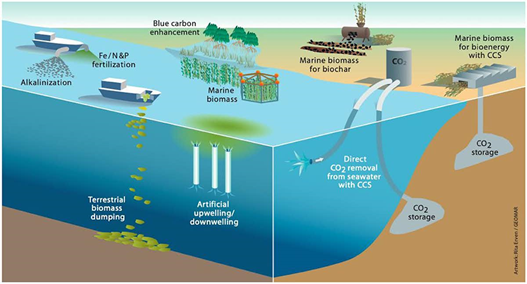

28th October 2022 (8 Topics)
Context
With an aim to trap Carbon dioxide to control Global warming and Climate change effects, the Oceans are being used deliberately to lock it. However, it arises several social and ethical questions regarding this technique against the lives related to the Ocean ecosystem.
About
How Carbon can be trapped using Oceans?
- Ocean carbon dioxide removal is any action designed to use the ocean to remove even more carbon dioxide from the atmosphere and store it.
- It spans a wide range of techniques – from increasing the amount and vitality of carbon dioxide-absorbing mangrove forests to using ocean fertilization to stimulate the growth of phytoplankton that absorb carbon dioxide to building pipelines that pump liquid carbon dioxide into formations under the seabed, where it can eventually solidify as carbonate rock.
- There are other forms of carbon dioxide removal i.e. planting trees. But they require large amounts of land that are needed for other essential uses, such as agriculture.
- Hence Oceans provide a large space and has the capacity to bear sustainably more carbon dioxide.
Do you Know?The ocean covers about 70% of the planet, and it naturally takes up carbon dioxide. In fact, about a quarter of human-produced carbon dioxide ends up in the ocean. |

What are the ethical Questionings related to the process?
Ocean carbon dioxide removal also raises a variety of ethical questions that do not have straightforward answers.
- Does it force people to consider the relationship between humans and nonhumans?
- Are humans obliged to intervene to reduce the impact on the climate, or ought we avoid ocean interventions?
- Do people have the right to purposefully intervene in the ocean or not?
- Are there specific obligations that humans ought to recognize when considering such options?
- Who is responsible to make decisions about ocean carbon dioxide removal and the consequences?
|
Stakeholders involved: |
Ethical values to keep in mind |
|
|
What are the ethical factors associated between Humans and the Environment?
- It must be considered that the issue of responsible personal conduct with respect to natural landscapes, resources, species, and non-human organisms is foremost important.
- Conduct by persons is the direct concern of moral philosophy. Moral responsibility normally implies knowledge, capacity, choice, and value significance.
- It is also concerned with the do's and don’ts of human beings to the environment.
- It deals with the ecological rights of all creatures present today as we are fruitful as those who will come next to live on the Earth.
- Hence, Ethical standards are necessary for the long–term conservation and maintenance of nature and its resource


